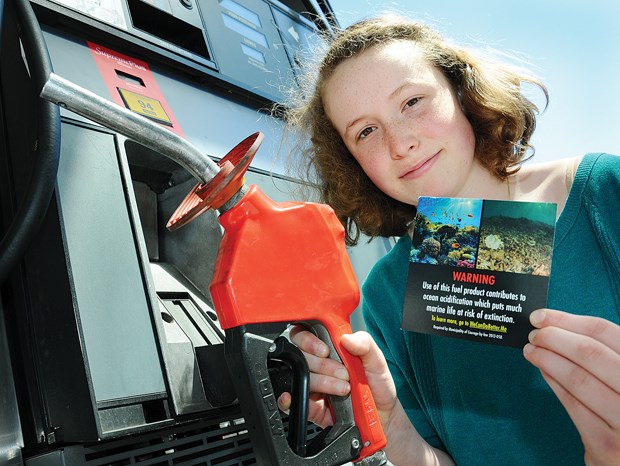Warning labels on gas nozzles may be what we need to dump the pump, according to one West Vancouver Collingwood School student.
Emily Kelsall, 16, is trying to persuade West Vancouver council to mandate reminders of climate change be affixed to all gas station pumps.
"I'm another teenager who's scared for my future," said Kelsall, a member of Our Horizon, a non-profit Canadian environmental group, in her address to council.
The labels feature images of children as well as animals in diverse habitats along with warnings about the risk of extinction faced by those animals.
The labels address two issues, said Kelsall: responsibility and delayed feedback.
"If you put your hand on a hot stove you immediately pull it back.
That would be immediate feedback. However, the most severe impacts of climate change are still down the road, so we don't gauge them as important," she said.
The labels allow car owners to see the consequences of global warming each time they fill up, which has a profoundly different effect than a price hike, according to Kelsall.
"We can raise prices on gasoline and carbon contributing sources all we want, but we will only ever be putting stress on the value of what lies in our wallet," she said.
Recalling the legal battle pitched by tobacco companies over similar labels on cigarette packs, Coun. Nora Gambioli expressed concerns about the district's ability to weather an onslaught of corporate lawyers.
"I know that gas companies are much larger than tobacco companies so my concern would be how many millions of dollars they would be willing
to throw at us to fight such a bylaw," Gambioli said. "That would be my concern as a municipal politician responsible for the litigation budget."
Following the council meeting, Kelsall discussed her strategy going forward, including
getting endorsements from scientists and professors.
"We're trying to get lawyers on our team... so if a legal battle does come we'll be well prepared," she said. "We don't want a lawsuit on West Vancouver's hands either."
In terms of a precedent,
Kelsall noted that municipalities have been successful in banning certain pesticides.
Coun. Bill Soprovich called Kelsall's proposal "a very sensible idea."
"I hope that we can be the first or second in Canada to go ahead and do
it," he said.
The issue may return to council in September, and Kelsall is hopeful chambers will be full of supporters for the initiative.
If West Vancouver passes on the gas pump plan, Kelsall, who circulated a petition to save trees while in kindergarten, said she may take her case to North Vancouver or the City of Vancouver.
Filling the tank is fuelling an abysmal future, according to Kelsall, who reminded council that while the worst outcomes are avoidable, global climate change is not up for debate in the scientific community.
"If you want to debate climate change you should probably have some pretty good evidence that the Earth is flat," she said.
Unless we reduce carbon emissions society will deal with rising sea levels, ocean acidification, and "generally very bad things," Kelsall said.
"Why would we play it small and stick to a minimalist approach in facing one of the most impactful crises in all of human history?" she asked. "Let's do something bold."



